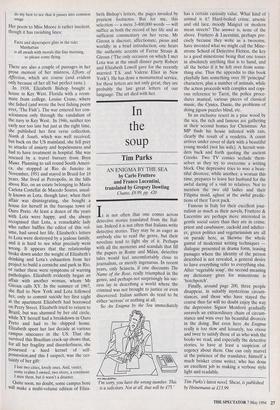In the soup
Tim Parks
AN ENIGMA BY THE SEA by Carlo Fruttero and Franco Lucentini, translated by Gregory Dowling Chatto, £9.99, pp. 420 It is not often that one comes across detective stories translated from the Ital- ian. Indeed it is not often that Italians write detective stories. They may be as eager as anybody else to read the genre, but their novelists tend to fight shy of it. Perhaps with all the mysteries and scandals that fill the papers in Rome and Milan, detective tales would feel uncomfortably close to journalism, or merely ingenuous. In recent years, only Sciascia, if one discounts The Name of the Rose, really triumphed in the genre, and perhaps not surprisingly his suc- cess lay in describing a world where the criminal was not brought to justice or even discovered. Italian authors do tend to be either 'serious' or nothing at all.
So An Enigma by the Sea immediately is a solicitors. Not at all, that will be £75.' by Heinemann at £13.99. has a certain curiosity value. What kind of animal is it? Hard-boiled crime, arsenic and old lace, moody Maigret or modern mean streets? The answer is, none of the above. Fruttero & Lucentini, perhaps pre- cisely because they write as a twosome, have invented what we might call the Mine- strone School of Detective Fiction, the key to a good minestrone being that one tosses in absolutely anything that is to hand, and all the better if it be left over from some- thing else. Thus the appendix to this book playfully lists something over 50 'principal' characters, plus a number of animals, while the action proceeds with complex and copi- ous reference to Tarot, the police proce- dures manual, various pieces of classical music, the Cynics, Dante, the problems of doing jigsaw puzzles blind, etc.
In an exclusive resort in a pine wood by the sea, the rich and famous are gathering at their second homes for Christmas. An MP finds his house infested with rats, clearly the result of a vendetta. A count arrives under cover of dark with a beautiful young model (not his wife). A hermit wan- ders back and forth quoting the ancient Greeks. Two TV comics seclude them- selves as they try to overcome a writing block. One depressive tries to woo a beau- tiful divorcee, while another, a woman this time, prepares to leave her husband for the awful daring of a visit to relatives. Not to mention the two old ladies and their Filipina maid, aghast at the awful predic- tions of their Tarot pack.
Famous in Italy for their excellent jour- nalism as much as their novels, Fruttero & Lucentini are perhaps more interested in gentle social satire than they are in crime; priest and carabiniere, cuckold and adulter- er, green politics and vegetarianism are all on parade here, as likewise the whole gamut of modernist writing techniques dialogue presented in drama form, teasing passages where the identity of the person described is not revealed, a general desire to have everything refer to everything else. After 'vegetable soup', the second meaning my dictionary gives for minestrone is `hotchpotch'.
Finally, around page 200, three people disappear, in suitably mysterious circum- stances, and those who have stayed the course thus far will no doubt enjoy the way the depressive Signor Monforti gradually unravels an extraordinary chain of circum- stance and wins over his beautiful divorcée in the doing. But even here An Enigma really is too slow and leisurely, too otiose and twee to satisfy those of us who wish the books we read, and especially the detective stories, to have at least a suspicion of urgency about them. One can only marvel at the patience of the translator, himself a much brisker crime writer, who has done an excellent job in making a verbose style light and readable.
sony, you have the wrong number. This Tim Parks's latest novel, Shear, is published


















































 Previous page
Previous page